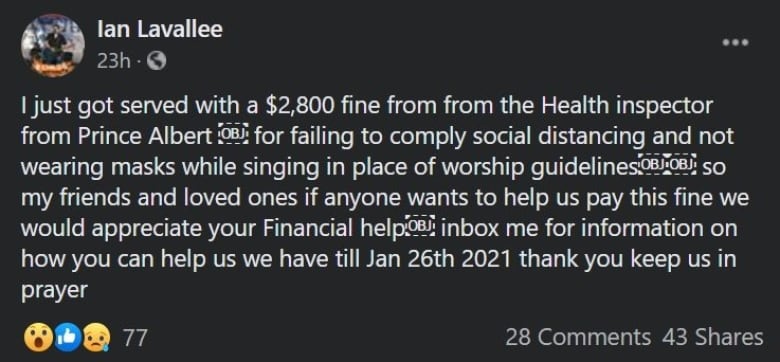At least 86 COVID-19 cases now tied to Prince Albert gospel centre superspreader
Newer 'third generation' of cases tied to outbreak can be hard to pin down: chief medical health officer

At least 86 cases of COVID-19 have been traced back to the Prince Albert gospel centre superspreader — not including a newer "third generation" of cases that Saskatchewan's chief medical health officer says can be hard to pin down.
"That's where, sometimes, the trail starts getting cold," Dr. Saqib Shahab said at his last COVID-19 news conference on Friday. "Public health is working very quickly to identify contacts of all cases."
Health officials have broken down cases connected to Prince Albert's Full Gospel Outreach Centre in three categories.
A first generation of people attended meetings at the church (where food was served and singers went unmasked) from Sept. 14 to Oct. 4 and tested positive for the virus.
A second generation of people came into contact with church attendees. Both first- and second-generation cases live primarily in communities north of Prince Albert.
First- and second-generation cases related to the superspreader total 86, the Saskatchewan Health Authority (SHA) stated on Monday. That's up from 79 cases on Friday.
"Many of the newer cases and outbreaks arising in the north are now third-generation cases from this event," Monday's release said, without specifying how many third-generation cases have been found.
Cases connected to the event are present in 17 communities and 450 people have been called by contract tracers so far, the SHA said.
"It is a very tragic situation that could have been avoided by compliance with distancing and masking," said Dennis Kendel, a Saskatoon-based health policy consultant.
Holders of gatherings must take names at the door
The gospel centre offered food and a place of worship for the needy. Shahab was asked if contract tracing homeless and vulnerable people was difficult. He said contract tracers have had "challenges" in reaching some contacts connected to the superspreader.
"We have to recognize that as the weather cools, if individuals are unable to isolate as cases or contacts, they will need support," he added.
Shahab said anybody who holds a gathering, whether at a business or private home or venue, needs to keep a list of all attendees and their contact information.
"That makes it easy [so] that, if there were a case at that event, you know, you just hand over that list," he said.
Shahab noted that many places of worship require people to register before they can attend events.
"Of course, the names and numbers have to be reliable," he said.
Regions touched by superspreader
Although the SHA says many northern communities have been affected by the superspreader, the extent to which particular regions in the north have been impacted is unclear, as individual cases are typically not publicly tied to any one event when reported.
Here's what we know:
Early in the outbreak, Peter Ballantyne Cree Nation said a woman from Southend tested positive for the virus after attending one of the Prince Albert church meetings as well as a funeral in Pelican Narrows. That person reportedly infected four other people: an elderly person in Southend and three people in Deschambault Lake.
On Friday, the First Nation declared an outbreak in Southend. The province's Far North East 1 division, which includes Southend, is currently one of the most active COVID-19 hotspots in the north, with 29 known active cases as of Sunday.

English River First Nation said a person who went to both Prince Albert's Full Gospel Outreach Centre and a later gospel-themed concert in Beauval tested positive for COVID-19. The First Nation cited two cases in Île-à-la-Crosse, although it was not clear if the church- and concert-goer was from Île-à-la-Crosse.
As of Sunday, the Far North West 1 region, which includes Île-à-la-Crosse, had 12 active cases.

2nd superspreader fine issued
Ian Lavallee, an evangelist who led meetings at the Prince Albert gospel and who said singers went unmasked (despite masks being offered at the door), was fined $2,800, including a victim surcharge, last week.
Lavallee declined to comment to CBC News, but wrote on his Facebook page that he received the fine for failing to comply with the physical distancing and masking rules outlined in Saskatchewan's "places of worship" guidelines.

The pastor at the gospel centre, Vern Temple, was previously fined $14,000, including a victim surcharge.
CBC Saskatchewan wants to tell more stories about how the pandemic is touching the province's most vulnerable and marginalized populations. How has COVID-19 affected you? Share your story with our online questionnaire.

